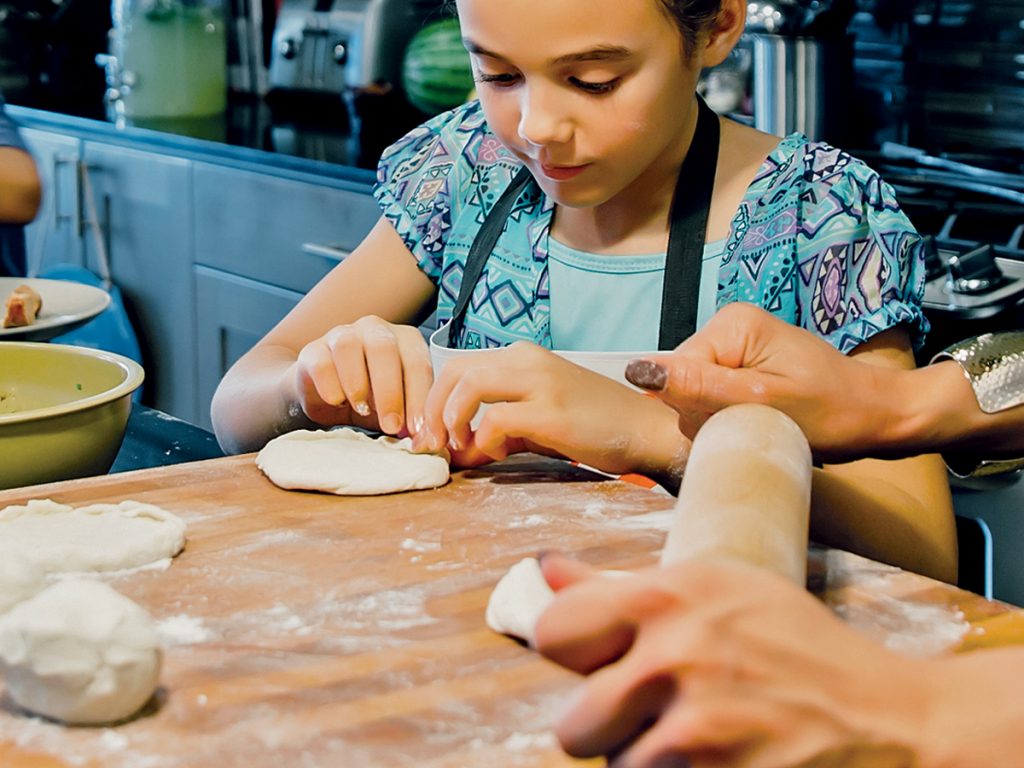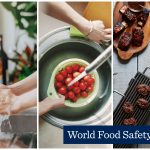How many times have you given your leftovers the “sniff test” before deciding they’re probably good for another day? What about licking the spoon before that delectable bowl of brownie batter makes it to the oven? Or even slapping those grilled-to-perfection burgers on the same plate you used to shape them into perfectly red, raw patties? I am certain it is not just my family that does these things to drive me crazy.
Chances are, most of us are guilty of these food safety faux pas in the comfort and privacy of our own homes, because it’s not like they’re that bad, right?!
Coming from the woman whose go-to wedding gift is a food thermometer, I’m sorry to burst your bubble: WRONG (unless salmonella or botulism sound like your idea of a good time)!
I know it might sound harsh, and you might have to seek professional help to kick your raw cookie dough habit, but as a food safety expert, it’s my job to understand and educate people on how these seemingly tiny food safety slip-ups can cause serious issues. That’s why I’m excited The United Nations announced June 7 as the inaugural World Food Safety Day, developed to raise awareness and inspire action to help prevent, detect and manage foodborne risks.
This year’s theme is “food safety, everyone’s business,” which rings true for Tyson Foods, since food safety truly is our business. All of our team members play a role in ensuring that our products are safe, from each person on the production line, quality assurance and safety teams, to those who make sure we get supplies and paychecks.
With the rigorous food safety practices we have in place, the only thing we’re spreading is knowledge: through our involvement with Fight BAC!: Partnership for Food Safety Education (PFSE), we provide resources to help consumers follow the same food safety practices at home that we follow in our plants.
Fight BAC!’s most essential set of guidelines is one that we strictly adhere to at Tyson and one that is easy enough to practice at home to kickstart your food safety journey: The Core Four. These four practices can prevent nasty bacteria from spreading in your kitchen and reduce the risk of foodborne illness. It’s as simple as clean, separate, cook, and chill.
CLEAN:
- Wash your hands with warm water and soap for at least 20 seconds
- Clean counter tops with hot water and soap after food prep, and clean refrigerator shelves regularly
- Rinse fruits and veggies before eating
SEPARATE:
- Separate raw meat, poultry, seafood and eggs from other food; place in separate bags at the grocery and place on the bottom shelf of the fridge, separate from other foods
- Use separate cutting boards for produce and raw meat, poultry, and seafood to prevent cross-contamination
- Never place cooked food on a plate that previously held raw meat, poultry, seafood or eggs
COOK:
- Cook food to a safe internal temperature
- Use a food thermometer; color and texture are NOT reliable indicators of whether a food has reached high enough temperature to kill bacteria
- Always follow recommended cooking method instructions on prepared foods; know your microwave wattage
CHILL:
- Keep fridge at 40 degrees or below to reduce the risk of foodborne illness and slow bacteria growth
- Refrigerate or freeze food (including leftovers!) within two hours of purchase or use
- Don’t give leftovers the sniff or nibble test; you can’t smell or taste harmful bacteria
- Never thaw foods at room temperature; the safest way to thaw frozen meat, poultry or seafood is on a plate in the fridge
While the official World Food Safety Day might be just one day out of the year, I’m proud to be part of the Tyson Foods team, where we celebrate World Food Safety Day every day.
Think you’re a food safety expert yet? Test your Food Safety IQ to find out. If you need a bit more practice, visit www.FightBAC.org to find educational materials to learn more about food safety. If you’re feeling social, follow the non-profit Partnership for Food Safety Education on Facebook at @FightBAC and on Twitter at @Fight_BAC.
Now, it’s off to wash my hands after serving you the dish on food safety.







3 Comments
Thanks
Thank you for the safty tips!! Have a great Thanksgiving!!!
Thank you for reminding me !!
Leave A Comment